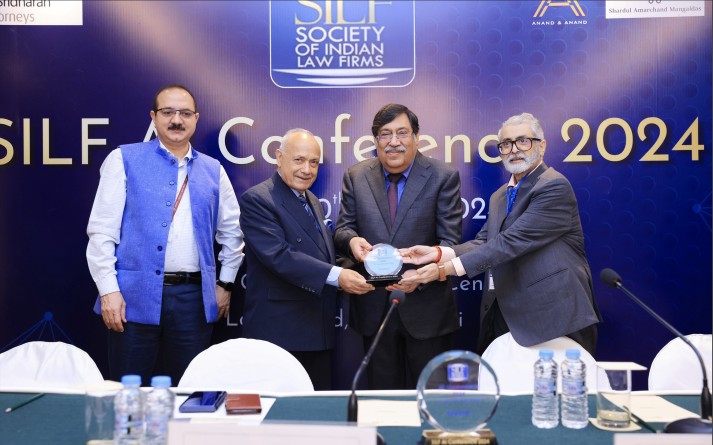SILF kicks off AI conference in New Delhi
19 April 2024

NEW DELHI (April 19, 2024) – “Government policies and programs are inspired by the spirit of AI for all. So the use of AI should not be limited to those who are elite, and technologically empowered, but it has to percolate down to the last man in the queue,” said Rajiv Mani, secretary, legislative department, in India’s Ministry of Law and Justice.
Mani was speaking at the inauguration of two-day SILF AI Conference 2024, organized by the Society of Indian Law Firms (SILF).
“The initiative of the government, the digital revolution, which we have witnessed in the last 10 years, nearly, you know, reaches down to the last man in the queue,” said Mani, adding that the purpose of the government’s tech initiatives is inclusivity.
SILF, under presiden Lalit Bhasin, managing partner at Bhasin and Co in New Delhi, organized the conference, which will see the participation of more than 12 national and international law firms and 44 speakers from the legal, tech, policy and industry spheres on the same stage to chart a roadmap for responsible and inclusive AI.
Talking about the effective disposal of cases and clearing of backlog, Mani said technology can be used to do so. He asserted that it should also reach the tier three cities because “that is where actually the people who are far from the seats of power reside and they are the persons who actually require the utmost attention of the new technological innovations which have been undertaken and which are used primarily for the benefit of those who reside in big metropolitan cities, and they are not to be deprived of that. So if the robust platforms are able to, you know, offer an opportunity for such parties and litigants who reside, maybe even in remote areas and not so prominent places, can also be benefited by the use of such mechanisms such as the use of AI.”
Bhuvnesh Kumar, additional secretary and group coordinator at the Ministry of Electronics and Information Technology (MeitY), praised technology that is able to detect disease in plants by simply taking a picture. He also stressed that constitutional values must be kept in mind while lauding the conference as an enabler to enforce the regulation side of AI.
Speaking at the conference, Bhasin highlighted how children as young as two or three years are getting addicted to mobile phones, and how this is a part of technology we have to live with.
“Without robust mechanism in place, there could be instances of AI hallucination,” he said, referring to fake information and misuse of Generative AI.
Bhasin also stressed the fear of emergence of a two-tier system where the poor may find themselves relegated to inferior AI systems while only high-end corporations can foster the benefits of AI. This, he said, will only widen the gap in the justice system.
Today, being the first day of voting for Lok Sabha (Parliament) seats, Bhasin showed a cutting of a newspaper report on AI misuse showing a Bollywood actor supporting both the Bharatiya Janata Party (BJP) and also the Indian National Congress party, and noted the need to check misuse of AI in elections.
Pravin Anand, SILF senior vice president and managing partner of Anand and Anand in Noida, shared a few categories of individuals who are at a higher risk of misuse of AI, including authors and background actors.
He touched upon the Luddite Fallacy – the mistaken belief that new technology leads to higher overall unemployment in the economy – and went on to add how AI had generated newer kinds of jobs, like prompt engineers. Speaking of regulating AI, Anand shared instances of data biases where AI systems confused a husky with a wolf or a child on all four with a dog while generating search results.
Reiterating how data was being likened to “new oil” and AI to “new electricity,” Anand also stressed the opportunities to regulate AI and grow. “When the industrial revolution happened, we were colonized. Today we are free, so we have the ability to take the lead and to beat the pathway for international global reform.”
Noted lawyer and senior vice president of SILF Shardul Shroff, founder of Shardul Amarchand Mangaldas & Co. in Delhi, also spoke on ‘responsible and trustworthy AI: key enabler for economic disruption’. He said that one should rather use the term ‘economic transformation’.
Justice (Retd) BN Srikrishna (retired judge, Supreme Court) and Maja Bogataj Jančič, founder and head of the Intellectual Property Institute in Ljubljana, Slovenia, and a member of the Working group on Data Governance of the Global Partnership on Artificial Intelligence (GPAI) delivered a keynote speech on data governance. Jančič touched on good governance for good data governance.
“We need to rethink everything. We cannot afford not to maximize social benefit,” she said.
Day 1 of the conference also had sessions on AI and Data Governance; Bridging the AI Divide with Global South and a fireside chat with AI startups, which had Vishnu Vardhar (founder of Vizzhy), Rajat Vardhar (co-founder of AgroNXT), Ashish Airon (co-founder of Cognitensor) and Rahul Pathri (founder of Docturnal).
On bridging the AI divide, panellist Mahaveer Singhvi, joint secretary, new and emerging technologies division, Ministry of External Affairs, said, “We are in an era where AI is reshaping the contours of our life, redefining life. The current trajectory of AI has left out the global South. The benefits of AI have not been distributed evenly. Those left behind are at the risk of being further marginalized. We need to bridge the divide between the global north and the global south”.
All the speakers in the conference were of the view that AI has massive transformative power but needs to be regulated to mitigate risks.
Day 2 of the SILF conference will feature Justice Pratibha Singh delivering a keynote on AI and IPR.
-- Akanksha Jain, Anand and Anand






